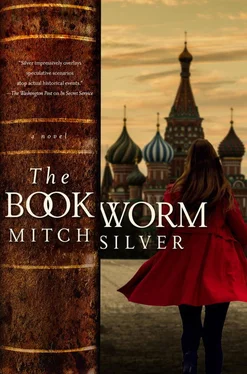Back in the Technology Department, he closed the door to the room and turned the lock, saying, “Have you got the quatrains?”
I patted them in my breast pocket. “I wrote them and, even so, I don’t understand them. Heaven knows what the Hun will make of our ditties in your Old French mumbo-jumbo.”
“The Hun, as you say, is smarter than you think.” Blunt fingered a couple of the small bottles of different liquids that lined a nearby shelf before taking one. “And it’s Middle French. Moyen français. There’s a difference.”
Then he spread a large white sheet of paper on the table and took out a doctor’s scalpel from a drawer. “Here, take this.” He brought over the thinner of the two books and set it down. “While I gather a few things, why don’t you do something useful, Noël, and make us some ink?”
With that, he opened the book at random and, taking the scalpel, began to scrape the page. A few bits of the black ink fell off in flakes onto the sheet of paper. “Now you do it. Not so hard that you scrape the parchment. All we want is the ink.”
For the next fifteen minutes I destroyed several pages of what I had originally assumed was a priceless volume, creating in the process a small hillock of the former lettering and causing my wrist and forearm no end of pain with the repetitive motion of the knife.
Blunt was assembling things from around the room over on his end of the table. Then he came closer and saw me rubbing my arm. “Be thankful I didn’t send you back downstairs to harvest dust. Beastly job, and you have to wear one of these.” He slid open a drawer full of surgeon’s masks, and shut it again. “Okay, that’s enough ink for a start.”
The art historian used the scalpel to scrape some of the shavings off the paper and into a Petri dish. Then he took an eyedropper and dipped it into the bottle of nearly clear liquid he’d chosen earlier. It said “Linseed oil” on the label. As soon as he poured two or three drops into the dish, the black scrapings dissolved in the medium, turning it dark.
“You see? Ink made from iron gall will reconstitute itself.” He swirled the mess in the dish with a glass pipette. “We let it sit for a couple of days et voilà, new 16th Century ink.”
“A couple of days?” I was stunned.
Blunt was unmoved. “Can’t be helped. You don’t fool meticulous people like the Germans with slapdash work. Besides, the bookworm will still have her job to do.”
Now I was totally unstrung. “Who… who’s this ‘bookworm’?”
Blunt picked up a matchbox from among the jumble of things on the table. He held it out. Mystified, I stared at it.
“Go on, open it.”
I did as I was told and found what looked like a common beetle.
“You asked who the bookworm was.” Blunt touched the beetle. “This is dear Mater. Oh, you’ve laid your eggs. That’s my good girl.” Blunt put the box back down on the table.
I could feel my entire plan crumbling away. I’d chosen a madman for the job just because his name was Blunt. “I don’t know what you’re playing at, Anthony, but I assumed… that is, the urgency…”
“Sit down, Noël, and I’ll explain.”
“I don’t want to sit down,” I said.
“All right then, go on pacing, I’ll explain anyway.” Blunt picked up the other book, the Bible, from the table and opened it to the flyleaf. He held it up to me. “This page where our faux prediction will go… do you see this hole here?”
“I thought it was just an imperfection in the paper.” Wrong thing to say.
“Not paper. Vellum. Big difference. In the Middle Ages, vellum, or parchment, was made from calfskin that was wetted down, dipped in a bath of lime and left there for more than a week to get all the hair off, stretched, dried, scraped, and possibly dipped in the lime again until it was nearly translucent. Okay, now what’s the biggest difference between vellum and paper?”
Without even waiting for me to attempt an answer, he went on. “It’s made from the skin of an animal. Animals get all manner of insects gnawing away at them. Some of them deposit larvae that do their gnawing from the inside, making a hole in the animal’s hide so they can get out.”
“I see,” I said, though obviously I didn’t.
“Sit down, Noël. It’s easy, really. Let’s say we’re Germans. Art historians, very good ones; we get an old book and want to make sure everything is on the up and up. What do we do? If we were French or Italian, we’d flip through the pages and see if it looked all right. But no, we’re German. We do scientific tests. On the ink. On the paper, the vellum in this case. On the hole in it. Did someone in England make the hole last month, or did some hungry insect chew his way through it four centuries ago?
“All right, let’s recall our plan: we want it to seem as if Michel de Nostradamus, this apothecary who has visions, was traveling around the countryside in the 16th Century, dispensing his little prophecies about this and that, when he had one of his brainstorms about the future.
“We have a wonderful library here, and I dug a up a few little pearls. From a letter he wrote in 1562, we know Nostradamus visited an abbey at Villers-devant-Orval. So, what if he were overcome in the night by another of his terrible visions—this one four centuries in the future—and wrote down what he had seen on the only ‘paper’ he could find at the abbey: the flyleaf of a Bible?”
“And if the crazy old sod wrote his vision down in someone else’s Bible, he couldn’t very well carry it off with him; books were rather valuable back then. We know he spoke of some final prophecies he never published before he died. Perhaps this was one of them.”
I was still confused. “But that doesn’t explain the beetle in the matchbox.”
“Oh, you mean my Anobium punctatum. She’s a furniture beetle. And she’s just become a mother many times over.”
With a cloth, he cleaned the glass pipette he’d used to stir the ink and now poked the beetle with it so we could better see the eggs she’d laid. There were dozens. “When these eggs hatch, the larvae, the bookworms that emerge, are ravenous. And they do what baby furniture beetles do: eat through anything in their way, boring long cylindrical holes in the leaves of books, the bindings, even the bookshelf.
“So, while the ink is steeping, I intend to take your poetry”—at this he held out his hand, leaving it there until I withdrew the lines I’d laboured over and placed them in his palm—“and translate it into something Nostradamus might recognise as his own. Then I will write it upon the vellum flyleaf with the quill pen over there, taking care to go directly over the hole you see in it now.
“That hole is our starting point. When the ink is thoroughly dry I will encourage these brand-new and very hungry beetles to create a hole at the exact same spot in the binding and in the overleaf. When we are done, it will appear that bookworms, over the ages, created one continuous hole in the pages on either side of the prophecy, partly obliterating Nostradamus’s writing. Effectively we will have ‘married’ our simulacrum to the original text of the Bible.”
I had been waiting for Blunt to take a breath so I could ask, “And how does one ‘encourage’ a bookworm?”
Blunt drew out a pot of school paste. “With this. The little buggers think it’s caviar. I’ll just dab a bit where I want them to go and let Nature take her course.”
I felt my restlessness coming back, so I got to my feet. I tried a smile. “And how much time does Nature require?”
“Not more than six weeks.”
“Six weeks! Why that’s… that’s almost September! The whole country might be forced to learn German by then!”
Читать дальше












